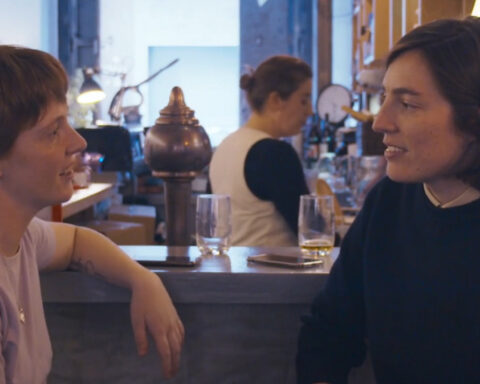Over the past 15 years, Montreal-based filmmaker Denis Côté has proven himself to be one of the most unusual and distinctive voices in Quebec’s robust cinema milieu. From Nos vies privées (Our Private Lives, 2007) to last year’s Carcasses, he has made films that are consistently challenging and counter-cinematic. His work is antithetical to Quebec’s popular nods to American genre filmmaking, like Bon Cop, Bad Cop; he serves as a constant reminder of the maverick streak that has run through so much of Quebec’s national cinema. His background is that of criticism: for several years, he was the chief film critic at the French-language Montreal weekly Ici, where he spared no one with his poison pen, earning some enemies but gaining a staunchly loyal following of readers.
This fall will see the premiere of his fifth feature, Curling, an obtuse and unusual film about a very dysfunctional single-parent family. In it, a strange and seemingly lonely man tells authorities that his young daughter has no need for public school, as he is teaching her at home. There, the two seem to languish in a netherworld, secluded from the rest of humanity. It’s unclear what he’s protecting her from, but his own life is entirely grim, working in a soulless job at the local bowling alley.
Things get even stranger when we learn that not far from the rural house is a pile of corpses, mysteriously lying frozen in the snow. Curling is full of dread and suspense, and instead of offering us easy answers, the film keeps us guessing as to precisely what is going on and who’s responsible. Like Australian director Peter Weir, Côté opts for ambiguity.
Côté also manages to give us some documentary-style verisimilitude. Everything about Curling feels spookily real. And Côté, who wrote the screenplay as well as directing, reports that his inspiration came from a news item he read. “There were several sparks, in fact. I read a news story that seemed to me morbid, spectacular and ultimately seductive. I think it was in Alberta. A dozen bodies were found in the middle of a cornfield. It was a settling of accounts by a criminal bike gang, no doubt.”
Côté recalls that he originally envisioned Curling as a summer parable. But then he gave in to the harsh reality of Canadian winters. “The wintertime setting seemed a good challenge. I thought winter could become a character. I looked at some masterworks again, including Victor Erice’s The Spirit of the Beehive as well as Charles Laughton’s The Night of the Hunter. I liked the idea of closely-guarded, properly raised children who, despite everything, ultimately fall upon horror. As well, there was my obsession of writing a story in which the characters are slightly removed from the rest of the world.”
When I tell Côté that I feel his films always have a powerful documentary feel about them, he’s not entirely surprised. But he’s quick to add that the sense probably doesn’t come from his doc influences. “In the case of Curling, director of photography Josée Deshaies and I talked a lot about the impact of the Berlin School films [made by such young German directors as Arslan, Schanelec and Petzold]. Artistically, I feel very close to these German contemporary films. The atmosphere is hyper-realistic, and somehow kinda bleak—you feel every character could be your silent neighbour doing anything from banal to horrible things.”
Côté insisted on keeping things very minimal. “There’s no showmanship in the filmmaking, no tricks with the lighting, the editing is dry, disciplined, sometimes austere. Performances are very naturalistic— there are no unnecessary digressions. This strain of cinema is simple but very precise and controlled at the same time. All these elements give an authenticity to the final result and it becomes a compliment if some viewer feels there’s a documentary feel to the whole thing.”
While Côté discusses how controlled his films are, he also notes that he avoids too much rehearsal with his actors. “I get bored easily with rehearsals. It’s not theatre, it’s cinema, and I can’t imagine myself sitting with actors in a room, around a table, reading a script. We meet, we become friends and talk about general things. I want to make sure they’re comfortable with the material. I can’t relate to anything unless we are in the location the day of the shoot. When everybody from every department seems happy, we start and we try stuff. I don’t shoot many takes. My scenes and my films are simple, the actors are professional, there’s no use complicating everything with too many words, thoughts, tryouts, stunts and other crap.”
And, on occasion, he gives his actors room to improvise a bit. “My films are very different from one another. But I make sure we always feel that kind of improvisational aura here and there. Sometimes some of the actors rewrite their lines, but usually they stick to the script. My films are deeply personal so I’m basically the only boss on set.
Curling was made on a tight schedule and a budget of $1 million. It’s sad to admit you can’t change your plans at the last minute. You must follow the program. You are much freer with extremely tiny budgets like I had on Carcasses. Working with four or five friends on a loose script is wonderful. But we also want to do bigger films like Curling. Then you need to walk straight and live with the rules of the unions and all the logistics that go along with that.”
Côté’s style is so wacky that he’s often either adopted as a darling by critics, or shunned by them. In 2007, Our Private Lives got great reviews in Europe but was listed as one of the worst films at TIFF by Toronto’s weekly NOW Magazine. “My films are made with very free-spirited, guerilla approaches. Some critics or film buffs are allergic to that urgency and react strongly to it. They get annoyed by what they consider arty, self-indulgent amateurism. Maybe they’re right. I don’t really care. Erich Rohmer used to say that a filmmaker needs to keep his ‘amateur side’ alive to stay passionate. I agree.”
And the über-harsh reviews? “I was a film critic, and at times quite a nasty one,” he says. “So I think it’s a bit easier for me to be a little detached and respect everybody’s opinion…I respect film criticism a lot. But at the same time, being nasty just for the sake of being nasty and different can affect your credibility sooner or later.”
While we’re on the topic of polarizing controversies, I have to venture into that nasty spot generating so much bile in the Quebec film milieu (and the rest of Canada, for that matter): the envelope system. This gives those producers who back money-making films a guaranteed chunk of the funding pie, in an effort to bolster figures at the box office. I assume this question is a no-brainer, and that Côté’s eyes are going to light up with rage when I broach the subject. He delivers.
“To be honest, since I’m considered and probably am a true independent, I will never benefit from these horrible envelopes. It’s a big lie. Crappy producers give birth to horrible films, then get shameful envelopes to produce even more commercial shit. I’m not an industry guy but, like everybody, I’m supposed to say that it creates jobs, it helps promote Canadian culture and it gets more and more Canadians to actually see Canadian films.
“I’m totally outside that bullshit and I don’t even waste time having an opinion about the whole thing. It will sound extremely selfish but if I can get my ridiculously little piece of the cake to make my arty films, then I’m fine.”











